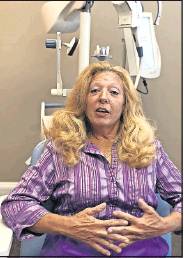‘Night and day difference’
Transcranical Magnetic Stimulation changed Theresa Schmehl’s life
By Charlie Patton charlie.patton@jacksonville.com
Theresa Schmehl has battled major depression most of her life, a life she has described as “one long premeditated suicide plan.”
Over time, the mother of two accepted her bleak moods as “something I’ve just got to learn to live with.”
But that wasn’t easy.
“I couldn’t enjoy family events,” she said. “Holidays were horrible.”
For many years she was under the care of psychiatrist George Joseph, who she describes as “an exceptional man who never gave up on me.”
Joseph tried various medications but Schmehl found that often the side effects of medication just made her life more difficult.
When Joseph, who died last September, was diagnosed with cancer, he gave her a list of psychiatrists from whom she could seek treatment.
She chose Marcus De Carvalho,a psychiatrist whose HPR Treatment Centers has offices on Jacksonville’s Southside and in Orange Park.
One of the options De Carvalho discussed with Schmehl was Transcranical Magnetic Stimulation (TMS), a treatment approach first approved by the Food and Drug Administration in 2008.
While TMS has been approved for a decade, some insurance companies have only started paying for the treatment in the last couple of years, De Carvalho said.
TMS involves electrical stimulation of the parts of the brain involved in mood control. But unlike electro-convulsive therapy (ECT), which became a common treatment for depression and bipolar disorder in the 1930s but later fell into disuse, it does not cause a seizure.
When De Carvalho, who planned to begin using TMS in February of this year, told Schmehl about the treatment option, her initial reaction was: “If it gets me off the medication I’ll do it.”
At first things didn’t go well. The technicians who mapped Schmehl’s brain in preparation for the treatments had problems because of abnormalities in her right hand.
During the first treatment, “I felt like there was a jackhammer on my head,” Schmehl said.
That wasn’t supposed to happen. Generally TMS treatment “is considered safe and well-tolerated,” said the Mayo Clinic’s website.
But a clinician remapped Schmehl’s brain using her other hand and adjusted the treatments.
“I thought, ‘This isn’t so bad,’” Schmehl said.
And the treatments were working, even if she didn’t notice at first.
“Other people noticed the change before I did,” Schmehl said.
“It was a night and day difference,” said Schmehl’s husband of 36 years, Stephen. “She’s like the person I’d married.”
“To see somebody who can’t get out of bed and now that person is looking forward to waking up in the morning; that’s incredible,” De Carvalho said.
Schmehl underwent 36 treatments, the last one in April.
She’s being slowly weaned off her medications. But she said she’s OK with continuing to take some medication.
“If I have to stay on the pills to feel this good and positive, I’ll take the pills,” she said. “Now I look forward to doing things.
“I’m not starting a new chapter. I’m starting a new book. I have a new life and I don’t want to do anything to change it.”
Charlie Patton:
(904) 359-4413
